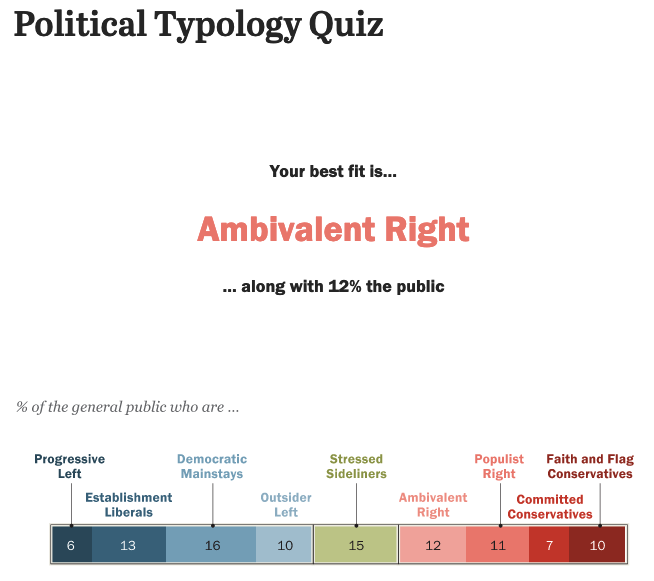As one of the many confused participants of the American democracy, I never quite understood how Trump was ever allowed to exist. Sure, I understand humanity’s history is rife with political leaders who embody despotism, but even with our collectively short memory, the names are not forgotten, nor do they fail to invoke derision: Mao, Castro, Mussolini, and of course Hitler.
So when Trump entered the political scene, who very openly possessed similar personality traits, I thought (incorrectly) that he simply just couldn’t be. How did he happen?
To seek an answer, I dug around on American political affiliations and voting habits, and was delighted to find a deeper analysis beyond “left” and “right”. It also helped bring me some personal closure to my own non-affiliated voting preferences, categorizing myself nicely as…

(The Pew study I’m referencing, as summarized by NPR, can be found here: https://www.npr.org/2021/11/09/1053929419/feel-like-you-dont-fit-in-either-political-party-heres-why
In the article is also a link to the quiz, but I’ll post here for convenience: https://www.pewresearch.org/politics/quiz/political-typology/)
Here’s what that says about me, according to the Pew study:
- 18% of Republicans and Republican-leaning independents
- the youngest and among the least religious and politically active of the Republican-leaning groups
- most don’t identify as “conservative” politically, but are conservative economically, on issues of race and in that they prefer smaller government
- more moderate than other Republicans on immigration, abortion, same-sex marriage and marijuana legalization
- lean toward the GOP but are not enamored with it; almost two-thirds would like Trump to not remain a national figure, and, in fact, a quarter identifies with Democrats and Democratic-leaning independents
- the only GOP-oriented group to say President Biden definitely or probably legitimately received the most votes in the 2020 election, and only about 4 in 10 believe the results of the 2022 elections “really matter”
I’d say that’s fairly close to what I expected: a slightly right-leaning independent. (Though my father often accuses me of being some ultra-right Republican loyalist. I guess, in comparison to his own political views, that’s how he would see me in comparison.)
More importantly, it means I can be swayed and do not vote out of a political ideology, nor do I worship an individual candidate. So for the main point of this post, this means that of all the conservative categories that would unquestioningly vote for Trump, I would be the one who might or might not. In theory, I wouldn’t be locked in by association. Why is this important? Because when adding the population percentages for each political category, even if the Republican candidate had all votes from the Ambivalent Right, he would still only have 40% of the popular vote. That may be enough, given that some of the Stressed Sideliners in the middle might vote for him, and with the electoral college ultimately making the final vote (which of course doesn’t require popular majority). But you can’t lose many of the Ambivalent Right with a margin that small. It’s a group that has to be swayed, and wasn’t swayed enough in the 2020 election, but was formerly swayed in 2016. I’m the group that makes the determination.
So what would it take to sway someone like myself who’s in this category? Let’s look at Trump as the individual.
In all of Trump’s monologues he juxtaposes questionable figures next to facts, presumably to give the illusion of association. It’s pseudo data, the inaccuracies of which quickly rule them out as having any grounds in reality.
Okay, so he can’t provide believable figures. What does he say he stands for then? Generally, everything that’s a soundbite for the right. But for the Ambivalent Right, that’s not necessarily a list of everything we want. In fact, much of it is not what we want. Therefore, it comes down to a comparison of candidates, and which one aligns better with personal political policy beliefs.
But there’s also a more basic human element to consider. Aside from being Republican, Trump’s primary “appeal” has been the “Fuck you!” attitude. I’ll explain why this is important, but first – a quick history lesson on feminism and American policy changes:
The Rift
During the second world war women were wholesale brought into the workforce for the war effort and gained a new financial independence.
No-fault divorce became available, famously in the form of its poster child: Reno, NV.
Women gained sexual freedom with contraceptive availability. Marriage and the nuclear family were no longer prerequisites to a woman’s sexual satisfaction.
The Equal Pay act went into effect which, in theory, mandated equal pay for women and equal availability of all job types.
The Equal Credit Opportunity Act was enacted and then women could obtain credit individually, further gaining financial independence.
This is obviously a very compressed timeline, but the point is that in the span of ~30 years, women became, at least on paper, the equals of men and guaranteed all the rights and privileges thereof.
The Pandering
But then things got nasty. With this demographic now financially established and making their own decisions, it only followed naturally that media, advertising, and policies shifted to earn their previously unexploited patronage.
Peaking in the 1990s, based on my own experiences anyway, media and advertisements adopted the script of husband = idiot/wife = knows everything. The world of men was now being taught that they couldn’t function independently themselves and needed women, while women didn’t need men.
More empirically, college enrollment and graduation rates shifted to become overwhelmingly dominated by women (I challenge you to dig into these discussions and avoid a flame war).
Companies and governments started employing varying policies on mandating female percentages of board members and executive positions.
Incarcerations rates of men became approximately 10X that of women.
80% of custodial divorcees are now women.
The Pushback
This is, admittedly, just a small portion of the recent gender narrative and lacks much of depth of study required to truly vet its anthropological implications. But a cursory glace would show that:
- Women gained financial freedom
- Women gained sexual freedom
- Women gained freedom from needing men
- Society started pandering to women and sidelining the needs of men
- Society started preferring women over men in certain circumstances
The Contemporary Themes
- Women are told that they’re superior to men but still need preferential treatment to achieve their potential
- Men are starting to feel disadvantaged to women and resent being abandoned by society
So How is This Related to Trumpism?
Here’s my theory. As stated before, only 1 of the 4 conservative groups is not pro-Trump. This group must have voted for Trump or he would not have been elected. But they don’t like Trump. Nor do they like most of the far-right that he represents. They like moderate-right, which is what Obama was, which is why Obama was elected. But they had to have voted for Trump or he wouldn’t have had sufficient votes. What happened?
This is where we return to the “Fuck you!” human element.
No moderate conservative would disagree with sexual egalitarianism being a bad thing. But the resultant pandering to women and subsequent steady disenfranchisement of men created…feelings. And unchecked feelings can cause bad decisions. Like Trump. It became personal. One too many conversations with a Progressive Left – one too many condescending comments from the elitist left – one too many accusations of privilege, when the workforce had just dug itself out of the Great Recession and employment opportunities were finally starting to improve, by a judgy and leftist younger population less impacted by the economic climate.
Trump was an opportunity to teach the far left a lesson. It was “Fuck you!”
My theory is that large numbers of right-leaning moderate men finally had enough. The irritation with the left overcame their rational political side and emotional decisions overcame reason. And this what when the political opponent in the election was a far-left liberal woman, the very personification of the elitist and condescending left!
I’m not saying that I voted or will vote for Trump, but on some level, I do understand his appeal. And that’s a very strange thing for me, an Ambivalent Right, to admit.
–Simon
